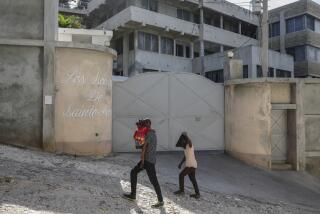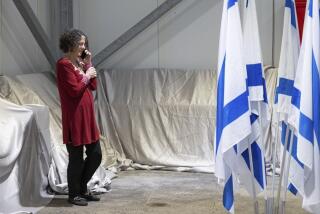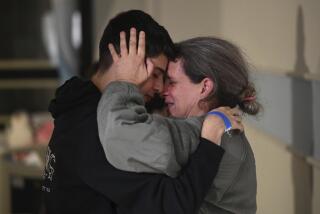2 Hostage Girls Freed in Libya, Fly Home to France
- Share via
NICOSIA, Cyprus — The Palestinian terrorist group headed by Abu Nidal released two kidnaped French girls in the Libyan city of Benghazi on Thursday, the official Libyan news agency reported.
The French Foreign Ministry later said Libyan authorities delivered the two sisters to their father, Pascal Betille, and a special French envoy at the French Embassy in Tripoli, wire services reported from Paris.
“France welcomes the children’s release and recognizes this humane gesture as such,” the Foreign Ministry said. “It thanks the foreign authorities who have contributed to it.”
The release of the two girls, Marie-Laure Betille, 7, and her sister Virginie, 6, was first announced Saturday, but their whereabouts remained a mystery until Thursday. In Libya, they were placed aboard a French military plane and arrived Thursday night at an air base near Marseilles with their father, a ministry spokeswoman said. They were greeted by their maternal grandparents and an uncle.
The girls, who wore dark, flowing Arab dresses and clutched stuffed animals, appeared to be in good health, according to eyewitnesses.
The release of the two girls was made for humanitarian reasons, according to the Abu Nidal group, which calls itself the Revolutionary Council of Fatah. The act underscored the links that are believed to exist between Abu Nidal and the Libyan government of Col. Moammar Kadafi.
“Following the appeal by the Guide of the Revolution (Kadafi) on the occasion of Christmas for the release of hostages detained in Lebanon, the two little French girls have been released,” the Libyan news agency JANA said in reporting that the sisters had arrived at the port city of Benghazi.
In Washington, the State Department welcomed the girls’ release and urged that all hostages in Lebanon be freed.
“We are always relieved and pleased when hostages are released,” spokeswoman Phyllis Oakley said. “We would certainly use this occasion to call for the unconditional release of all the hostages held in Lebanon. This must be seen as an humanitarian gesture and must be done without any preconditions.”
The release comes at a time when Kadafi is trying to win world support in the face of charges from the United States that Libya has completed work on a factory near Tripoli, the capital, designed for the production of chemical weapons.
The Abu Nidal group also has been trying to deflect suggestions that it may have had a role in placing a bomb aboard the Pan Am jumbo jet that crashed in Scotland last week, killing all 259 people aboard and at least 11 on the ground. British authorities announced Wednesday that they have found conclusive evidence that the plane was brought down by a bomb.
The two French girls were taken hostage along with their mother, Jacqueline Valente, and five Belgians in November, 1987, reportedly as they cruised in a yacht off the Israeli-occupied Gaza Strip. The girls also leave behind a baby sister born in captivity.
The Revolutionary Council of Fatah, an extremist faction that broke with the Palestine Liberation Organization in 1974, has accused the six adults of being agents for the Mossad, the Israeli secret service. Since their capture, virtually nothing had been heard of the hostages until Abu Nidal’s spokesman in Lebanon made the announcement of their imminent release.
The Palestinian organization, which is believed to maintain camps in Lebanon’s eastern Bekaa Valley, said the girls were visited by Abu Nidal, whose real name is Sabri Banna, before their release at a secret post in Lebanon.
There has been speculation for some time that Abu Nidal had moved the prisoners to Libya, which has become the only Arab state willing to openly tolerate the presence of Abu Nidal’s people.
A number of Western diplomats said they believe that the announcement of the release, which was said to involve a boat trip across the Mediterranean from Lebanon, was a hoax aimed at disguising the fact that the hostages were being held in Libya.
In what was seen as a rare disavowal, an Abu Nidal spokesman named Atef abu Bakr earlier extended condolences to the families of those on board the Pan Am plane, expressing “deepest sorrow for this tragedy.”
Because of the allegations about the chemical warfare factory, which Kadafi has denied, and because of the suspicions raised by the Pan Am crash, there are growing concerns in the Arab world that the United States might mount a retaliatory strike against Libya.
U.S. warplanes attacked military sites at Tripoli and Benghazi in April, 1986, in retaliation for the terrorist bombing of a West Berlin discotheque that killed a U.S. soldier and a Turkish woman. A second U.S. serviceman died later.
More to Read
Sign up for Essential California
The most important California stories and recommendations in your inbox every morning.
You may occasionally receive promotional content from the Los Angeles Times.













